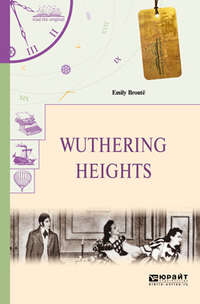 полная версия
полная версияWuthering Heights
'How can you lie so glaringly to the poor child?' I called from the inside. 'Pray ride on! How can you deliberately get up such paltry falsehoods? Miss Cathy, I'll knock the lock off with a stone: you won't believe that vile nonsense. You can feel in yourself it is impossible that a person should die for love of a stranger.'
'I was not aware there were eavesdroppers,' muttered the detected villain. 'Worthy Mrs. Dean, I like you, but I don't like your double-dealing,' he added aloud. 'How could YOU lie so glaringly as to affirm I hated the "poor child"? and invent bugbear stories to terrify her from my door-stones? Catherine Linton (the very name warms me), my bonny lass, I shall be from home all this week; go and see if have not spoken truth: do, there's a darling! Just imagine your father in my place, and Linton in yours; then think how you would value your careless lover if he refused to stir a step to comfort you, when your father himself entreated him; and don't, from pure stupidity, fall into the same error. I swear, on my salvation, he's going to his grave, and none but you can save him!'
The lock gave way and I issued out.
'I swear Linton is dying,' repeated Heathcliff, looking hard at me. 'And grief and disappointment are hastening his death. Nelly, if you won't let her go, you can walk over yourself. But I shall not return till this time next week; and I think your master himself would scarcely object to her visiting her cousin.'
'Come in,' said I, taking Cathy by the arm and half forcing her to re-enter; for she lingered, viewing with troubled eyes the features of the speaker, too stern to express his inward deceit.
He pushed his horse close, and, bending down, observed – 'Miss Catherine, I'll own to you that I have little patience with Linton; and Hareton and Joseph have less. I'll own that he's with a harsh set. He pines for kindness, as well as love; and a kind word from you would be his best medicine. Don't mind Mrs. Dean's cruel cautions; but be generous, and contrive to see him. He dreams of you day and night, and cannot be persuaded that you don't hate him, since you neither write nor call.'
I closed the door, and rolled a stone to assist the loosened lock in holding it; and spreading my umbrella, I drew my charge underneath: for the rain began to drive through the moaning branches of the trees, and warned us to avoid delay. Our hurry prevented any comment on the encounter with Heathcliff, as we stretched towards home; but I divined instinctively that Catherine's heart was clouded now in double darkness. Her features were so sad, they did not seem hers: she evidently regarded what she had heard as every syllable true.
The master had retired to rest before we came in. Cathy stole to his room to inquire how he was; he had fallen asleep. She returned, and asked me to sit with her in the library. We took our tea together; and afterwards she lay down on the rug, and told me not to talk, for she was weary. I got a book, and pretended to read. As soon as she supposed me absorbed in my occupation, she recommenced her silent weeping: it appeared, at present, her favourite diversion. I suffered her to enjoy it a while; then I expostulated: deriding and ridiculing all Mr. Heathcliff's assertions about his son, as if I were certain she would coincide. Alas! I hadn't skill to counteract the effect his account had produced: it was just what he intended.
'You may be right, Ellen,' she answered; 'but I shall never feel at ease till I know. And I must tell Linton it is not my fault that I don't write, and convince him that I shall not change.'
What use were anger and protestations against her silly credulity? We parted that night – hostile; but next day beheld me on the road to Wuthering Heights, by the side of my wilful young mistress's pony. I couldn't bear to witness her sorrow: to see her pale, dejected countenance, and heavy eyes: and I yielded, in the faint hope that Linton himself might prove, by his reception of us, how little of the tale was founded on fact.
Chapter XXIII
THE rainy night had ushered in a misty morning – half frost, half drizzle – and temporary brooks crossed our path – gurgling from the uplands. My feet were thoroughly wetted; I was cross and low; exactly the humour suited for making the most of these disagreeable things. We entered the farm-house by the kitchen way, to ascertain whether Mr. Heathcliff were really absent: because I put slight faith in his own affirmation.
Joseph seemed sitting in a sort of elysium alone, beside a roaring fire; a quart of ale on the table near him, bristling with large pieces of toasted oat-cake; and his black, short pipe in his mouth. Catherine ran to the hearth to warm herself. I asked if the master was in? My question remained so long unanswered, that I thought the old man had grown deaf, and repeated it louder.
'Na – ay!' he snarled, or rather screamed through his nose. 'Na – ay! yah muh goa back whear yah coom frough.'
'Joseph!' cried a peevish voice, simultaneously with me, from the inner room. 'How often am I to call you? There are only a few red ashes now. Joseph! come this moment.'
Vigorous puffs, and a resolute stare into the grate, declared he had no ear for this appeal. The housekeeper and Hareton were invisible; one gone on an errand, and the other at his work, probably. We knew Linton's tones, and entered.
'Oh, I hope you'll die in a garret, starved to death!' said the boy, mistaking our approach for that of his negligent attendant.
He stopped on observing his error: his cousin flew to him.
'Is that you, Miss Linton?' he said, raising his head from the arm of the great chair, in which he reclined. 'No – don't kiss me: it takes my breath. Dear me! Papa said you would call,' continued he, after recovering a little from Catherine's embrace; while she stood by looking very contrite. 'Will you shut the door, if you please? you left it open; and those – those DETESTABLE creatures won't bring coals to the fire. It's so cold!'
I stirred up the cinders, and fetched a scuttleful myself. The invalid complained of being covered with ashes; but he had a tiresome cough, and looked feverish and ill, so I did not rebuke his temper.
'Well, Linton,' murmured Catherine, when his corrugated brow relaxed, 'are you glad to see me? Can I do you any good?'
'Why didn't you come before?' he asked. 'You should have come, instead of writing. It tired me dreadfully writing those long letters. I'd far rather have talked to you. Now, I can neither bear to talk, nor anything else. I wonder where Zillah is! Will you' (looking at me) 'step into the kitchen and see?'
I had received no thanks for my other service; and being unwilling to run to and fro at his behest, I replied – 'Nobody is out there but Joseph.'
'I want to drink,' he exclaimed fretfully, turning away. 'Zillah is constantly gadding off to Gimmerton since papa went: it's miserable! And I'm obliged to come down here – they resolved never to hear me up-stairs.'
'Is your father attentive to you, Master Heathcliff?' I asked, perceiving Catherine to be checked in her friendly advances.
'Attentive? He makes them a little more attentive at least,' he cried. 'The wretches! Do you know, Miss Linton, that brute Hareton laughs at me! I hate him! indeed, I hate them all: they are odious beings.'
Cathy began searching for some water; she lighted on a pitcher in the dresser, filled a tumbler, and brought it. He bid her add a spoonful of wine from a bottle on the table; and having swallowed a small portion, appeared more tranquil, and said she was very kind.
'And are you glad to see me?' asked she, reiterating her former question and pleased to detect the faint dawn of a smile.
'Yes, I am. It's something new to hear a voice like yours!' he replied. 'But I have been vexed, because you wouldn't come. And papa swore it was owing to me: he called me a pitiful, shuffling, worthless thing; and said you despised me; and if he had been in my place, he would be more the master of the Grange than your father by this time. But you don't despise me, do you, Miss —?'
'I wish you would say Catherine, or Cathy,' interrupted my young lady. 'Despise you? No! Next to papa and Ellen, I love you better than anybody living. I don't love Mr. Heathcliff, though; and I dare not come when he returns: will he stay away many days?'
'Not many,' answered Linton; 'but he goes on to the moors frequently, since the shooting season commenced; and you might spend an hour or two with me in his absence. Do say you will. I think I should not be peevish with you: you'd not provoke me, and you'd always be ready to help me, wouldn't you?'
'Yes" said Catherine, stroking his long soft hair: 'if I could only get papa's consent, I'd spend half my time with you. Pretty Linton! I wish you were my brother.'
'And then you would like me as well as your father?' observed he, more cheerfully. 'But papa says you would love me better than him and all the world, if you were my wife; so I'd rather you were that.'
'No, I should never love anybody better than papa,' she returned gravely. 'And people hate their wives, sometimes; but not their sisters and brothers: and if you were the latter, you would live with us, and papa would be as fond of you as he is of me.'
Linton denied that people ever hated their wives; but Cathy affirmed they did, and, in her wisdom, instanced his own father's aversion to her aunt. I endeavoured to stop her thoughtless tongue. I couldn't succeed till everything she knew was out. Master Heathcliff, much irritated, asserted her relation was false.
'Papa told me; and papa does not tell falsehoods,' she answered pertly.
'MY papa scorns yours!' cried Linton. 'He calls him a sneaking fool.'
'Yours is a wicked man,' retorted Catherine; 'and you are very naughty to dare to repeat what he says. He must be wicked to have made Aunt Isabella leave him as she did.'
'She didn't leave him,' said the boy; 'you sha'n't contradict me.'
'She did,' cried my young lady.
'Well, I'll tell you something!' said Linton. 'Your mother hated your father: now then.'
'Oh!' exclaimed Catherine, too enraged to continue.
'And she loved mine,' added he.
'You little liar! I hate you now!' she panted, and her face grew red with passion.
'She did! she did!' sang Linton, sinking into the recess of his chair, and leaning back his head to enjoy the agitation of the other disputant, who stood behind.
'Hush, Master Heathcliff!' I said; 'that's your father's tale, too, I suppose.'
'It isn't: you hold your tongue!' he answered. 'She did, she did, Catherine! she did, she did!'
Cathy, beside herself, gave the chair a violent push, and caused him to fall against one arm. He was immediately seized by a suffocating cough that soon ended his triumph. It lasted so long that it frightened even me. As to his cousin, she wept with all her might, aghast at the mischief she had done: though she said nothing. I held him till the fit exhausted itself. Then he thrust me away, and leant his head down silently. Catherine quelled her lamentations also, took a seat opposite, and looked solemnly into the fire.
'How do you feel now, Master Heathcliff?' I inquired, after waiting ten minutes.
'I wish SHE felt as I do,' he replied: 'spiteful, cruel thing! Hareton never touches me: he never struck me in his life. And I was better to-day: and there – ' his voice died in a whimper.
'I didn't strike you!' muttered Cathy, chewing her lip to prevent another burst of emotion.
He sighed and moaned like one under great suffering, and kept it up for a quarter of an hour; on purpose to distress his cousin apparently, for whenever he caught a stifled sob from her he put renewed pain and pathos into the inflexions of his voice.
'I'm sorry I hurt you, Linton,' she said at length, racked beyond endurance. 'But I couldn't have been hurt by that little push, and I had no idea that you could, either: you're not much, are you, Linton? Don't let me go home thinking I've done you harm. Answer! speak to me.'
'I can't speak to you,' he murmured; 'you've hurt me so that I shall lie awake all night choking with this cough. If you had it you'd know what it was; but YOU'LL be comfortably asleep while I'm in agony, and nobody near me. I wonder how you would like to pass those fearful nights!' And he began to wail aloud, for very pity of himself.
'Since you are in the habit of passing dreadful nights,' I said, 'it won't be Miss who spoils your ease: you'd be the same had she never come. However, she shall not disturb you again; and perhaps you'll get quieter when we leave you.'
'Must I go?' asked Catherine dolefully, bending over him. 'Do you want me to go, Linton?'
'You can't alter what you've done,' he replied pettishly, shrinking from her, 'unless you alter it for the worse by teasing me into a fever.'
'Well, then, I must go?' she repeated.
'Let me alone, at least,' said he; 'I can't bear your talking.'
She lingered, and resisted my persuasions to departure a tiresome while; but as he neither looked up nor spoke, she finally made a movement to the door, and I followed. We were recalled by a scream. Linton had slid from his seat on to the hearthstone, and lay writhing in the mere perverseness of an indulged plague of a child, determined to be as grievous and harassing as it can. I thoroughly gauged his disposition from his behaviour, and saw at once it would be folly to attempt humouring him. Not so my companion: she ran back in terror, knelt down, and cried, and soothed, and entreated, till he grew quiet from lack of breath: by no means from compunction at distressing her.
'I shall lift him on to the settle,' I said, 'and he may roll about as he pleases: we can't stop to watch him. I hope you are satisfied, Miss Cathy, that you are not the person to benefit him; and that his condition of health is not occasioned by attachment to you. Now, then, there he is! Come away: as soon as he knows there is nobody by to care for his nonsense, he'll be glad to lie still.'
She placed a cushion under his head, and offered him some water; he rejected the latter, and tossed uneasily on the former, as if it were a stone or a block of wood. She tried to put it more comfortably.
'I can't do with that,' he said; 'it's not high enough.'
Catherine brought another to lay above it.
'That's too high,' murmured the provoking thing.
'How must I arrange it, then?' she asked despairingly.
He twined himself up to her, as she half knelt by the settle, and converted her shoulder into a support.
'No, that won't do,' I said. 'You'll be content with the cushion, Master Heathcliff. Miss has wasted too much time on you already: we cannot remain five minutes longer.'
'Yes, yes, we can!' replied Cathy. 'He's good and patient now. He's beginning to think I shall have far greater misery than he will to-night, if I believe he is the worse for my visit: and then I dare not come again. Tell the truth about it, Linton; for I musn't come, if I have hurt you.'
'You must come, to cure me,' he answered. 'You ought to come, because you have hurt me: you know you have extremely! I was not as ill when you entered as I am at present – was I?'
'But you've made yourself ill by crying and being in a passion. – I didn't do it all,' said his cousin. 'However, we'll be friends now. And you want me: you would wish to see me sometimes, really?'
'I told you I did,' he replied impatiently. 'Sit on the settle and let me lean on your knee. That's as mamma used to do, whole afternoons together. Sit quite still and don't talk: but you may sing a song, if you can sing; or you may say a nice long interesting ballad – one of those you promised to teach me; or a story. I'd rather have a ballad, though: begin.'
Catherine repeated the longest she could remember. The employment pleased both mightily. Linton would have another, and after that another, notwithstanding my strenuous objections; and so they went on until the clock struck twelve, and we heard Hareton in the court, returning for his dinner.
'And to-morrow, Catherine, will you be here to-morrow?' asked young Heathcliff, holding her frock as she rose reluctantly.
'No,' I answered, 'nor next day neither.' She, however, gave a different response evidently, for his forehead cleared as she stooped and whispered in his ear.
'You won't go to-morrow, recollect, Miss!' I commenced, when we were out of the house. 'You are not dreaming of it, are you?'
She smiled.
'Oh, I'll take good care,' I continued: 'I'll have that lock mended, and you can escape by no way else.'
'I can get over the wall,' she said laughing. 'The Grange is not a prison, Ellen, and you are not my gaoler. And besides, I'm almost seventeen: I'm a woman. And I'm certain Linton would recover quickly if he had me to look after him. I'm older than he is, you know, and wiser: less childish, am I not? And he'll soon do as I direct him, with some slight coaxing. He's a pretty little darling when he's good. I'd make such a pet of him, if he were mine. We should, never quarrel, should we after we were used to each other? Don't you like him, Ellen?'
'Like him!' I exclaimed. 'The worst-tempered bit of a sickly slip that ever struggled into its teens. Happily, as Mr. Heathcliff conjectured, he'll not win twenty. I doubt whether he'll see spring, indeed. And small loss to his family whenever he drops off. And lucky it is for us that his father took him: the kinder he was treated, the more tedious and selfish he'd be. I'm glad you have no chance of having him for a husband, Miss Catherine.'
My companion waxed serious at hearing this speech. To speak of his death so regardlessly wounded her feelings.
'He's younger than I,' she answered, after a protracted pause of meditation, 'and he ought to live the longest: he will – he must live as long as I do. He's as strong now as when he first came into the north; I'm positive of that. It's only a cold that ails him, the same as papa has. You say papa will get better, and why shouldn't he?'
'Well, well,' I cried, 'after all, we needn't trouble ourselves; for listen, Miss, – and mind, I'll keep my word, – if you attempt going to Wuthering Heights again, with or without me, I shall inform Mr. Linton, and, unless he allow it, the intimacy with your cousin must not be revived.'
'It has been revived,' muttered Cathy, sulkily.
'Must not be continued, then,' I said.
'We'll see,' was her reply, and she set off at a gallop, leaving me to toil in the rear.
We both reached home before our dinner-time; my master supposed we had been wandering through the park, and therefore he demanded no explanation of our absence. As soon as I entered I hastened to change my soaked shoes and stockings; but sitting such awhile at the Heights had done the mischief. On the succeeding morning I was laid up, and during three weeks I remained incapacitated for attending to my duties: a calamity never experienced prior to that period, and never, I am thankful to say, since.
My little mistress behaved like an angel in coming to wait on me, and cheer my solitude; the confinement brought me exceedingly low. It is wearisome, to a stirring active body: but few have slighter reasons for complaint than I had. The moment Catherine left Mr. Linton's room she appeared at my bedside. Her day was divided between us; no amusement usurped a minute: she neglected her meals, her studies, and her play; and she was the fondest nurse that ever watched. She must have had a warm heart, when she loved her father so, to give so much to me. I said her days were divided between us; but the master retired early, and I generally needed nothing after six o'clock, thus the evening was her own. Poor thing! I never considered what she did with herself after tea. And though frequently, when she looked in to bid me good-night, I remarked a fresh colour in her cheeks and a pinkness over her slender fingers, instead of fancying the line borrowed from a cold ride across the moors, I laid it to the charge of a hot fire in the library.
Chapter XXIV
AT the close of three weeks I was able to quit my chamber and move about the house. And on the first occasion of my sitting up in the evening I asked Catherine to read to me, because my eyes were weak. We were in the library, the master having gone to bed: she consented, rather unwillingly, I fancied; and imagining my sort of books did not suit her, I bid her please herself in the choice of what she perused. She selected one of her own favourites, and got forward steadily about an hour; then came frequent questions.
'Ellen, are not you tired? Hadn't you better lie down now? You'll be sick, keeping up so long, Ellen.'
'No, no, dear, I'm not tired,' I returned, continually.
Perceiving me immovable, she essayed another method of showing her disrelish for her occupation. It changed to yawning, and stretching, and -
'Ellen, I'm tired.'
'Give over then and talk,' I answered.
That was worse: she fretted and sighed, and looked at her watch till eight, and finally went to her room, completely overdone with sleep; judging by her peevish, heavy look, and the constant rubbing she inflicted on her eyes. The following night she seemed more impatient still; and on the third from recovering my company she complained of a headache, and left me. I thought her conduct odd; and having remained alone a long while, I resolved on going and inquiring whether she were better, and asking her to come and lie on the sofa, instead of up-stairs in the dark. No Catherine could I discover up-stairs, and none below. The servants affirmed they had not seen her. I listened at Mr. Edgar's door; all was silence. I returned to her apartment, extinguished my candle, and seated myself in the window.
The moon shone bright; a sprinkling of snow covered the ground, and I reflected that she might, possibly, have taken it into her head to walk about the garden, for refreshment. I did detect a figure creeping along the inner fence of the park; but it was not my young mistress: on its emerging into the light, I recognised one of the grooms. He stood a considerable period, viewing the carriage-road through the grounds; then started off at a brisk pace, as if he had detected something, and reappeared presently, leading Miss's pony; and there she was, just dismounted, and walking by its side. The man took his charge stealthily across the grass towards the stable. Cathy entered by the casement-window of the drawing-room, and glided noiselessly up to where I awaited her. She put the door gently too, slipped off her snowy shoes, untied her hat, and was proceeding, unconscious of my espionage, to lay aside her mantle, when I suddenly rose and revealed myself. The surprise petrified her an instant: she uttered an inarticulate exclamation, and stood fixed.
'My dear Miss Catherine,' I began, too vividly impressed by her recent kindness to break into a scold, 'where have you been riding out at this hour? And why should you try to deceive me by telling a tale? Where have you been? Speak!'
'To the bottom of the park,' she stammered. 'I didn't tell a tale.'
'And nowhere else?' I demanded.
'No,' was the muttered reply.
'Oh, Catherine!' I cried, sorrowfully. 'You know you have been doing wrong, or you wouldn't be driven to uttering an untruth to me. That does grieve me. I'd rather be three months ill, than hear you frame a deliberate lie.'
She sprang forward, and bursting into tears, threw her arms round my neck.
'Well, Ellen, I'm so afraid of you being angry,' she said. 'Promise not to be angry, and you shall know the very truth: I hate to hide it.'
We sat down in the window-seat; I assured her I would not scold, whatever her secret might be, and I guessed it, of course; so she commenced -
'I've been to Wuthering Heights, Ellen, and I've never missed going a day since you fell ill; except thrice before, and twice after you left your room. I gave Michael books and pictures to prepare Minny every evening, and to put her back in the stable: you mustn't scold him either, mind. I was at the Heights by half-past six, and generally stayed till half-past eight, and then galloped home. It was not to amuse myself that I went: I was often wretched all the time. Now and then I was happy: once in a week perhaps. At first, I expected there would be sad work persuading you to let me keep my word to Linton: for I had engaged to call again next day, when we quitted him; but, as you stayed up-stairs on the morrow, I escaped that trouble. While Michael was refastening the lock of the park door in the afternoon, I got possession of the key, and told him how my cousin wished me to visit him, because he was sick, and couldn't come to the Grange; and how papa would object to my going: and then I negotiated with him about the pony. He is fond of reading, and he thinks of leaving soon to get married; so he offered, if I would lend him books out of the library, to do what I wished: but I preferred giving him my own, and that satisfied him better.









